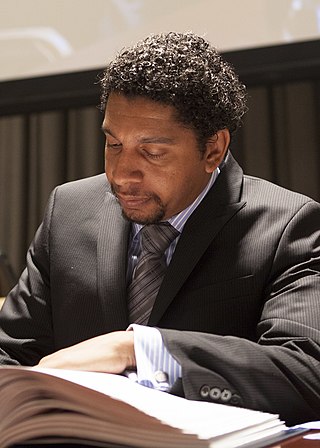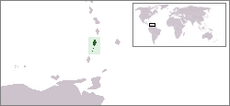
Saint Vincent and the Grenadines, sometimes known simply as Saint Vincent or SVG, is an island country in the eastern Caribbean. It is located in the southeast Windward Islands of the Lesser Antilles, which lie in the West Indies, at the southern end of the eastern border between the Caribbean Sea and the Atlantic Ocean. To the north lies Saint Lucia, to the east is Barbados, and Grenada lies to the south.

This is a demography of the population of Saint Vincent and the Grenadines including population density, ethnicity, religious affiliations and other aspects of the population.

The economy of Saint Vincent and the Grenadines is heavily dependent on agriculture, being the world's leading producer of arrowroot and grows other exotic fruit, vegetables and root crops. Bananas alone account for upwards of 60% of the work force and 50% of merchandise exports in Saint Vincent and the Grenadines. Such reliance on a single crop makes the economy vulnerable to external factors. St. Vincent's banana growers benefited from preferential access to the European market. In view of the European Union's announced phase-out of this preferred access, economic diversification is a priority.
Saint Vincent and the Grenadines have no regular military force; the paramilitary Special Service Unit and the Coast Guard are both under the command of the Royal Saint Vincent and the Grenadines Police Force. As of 2010, there are an estimated 31,489 males age 16-49 available for military service, and an estimated 28,518 males age 16–49, fit for military service. Each year, approximately 1169 males and 1224 females reach military age, as estimated in 2010.
Saint Vincent and the Grenadines maintains close ties to the US, Canada, and the United Kingdom, and cooperates with regional political and economic organizations such as the Organisation of Eastern Caribbean States (OECS) and CARICOM. St. Vincent and the Grenadines is a member of the United Nations, the Commonwealth of Nations, the Organization of American States, and the Association of Caribbean States (ACS). Saint Vincent is also the smallest nation ever to be on the United Nations Security Council.
The Eastern Caribbean Securities Exchange (ECSE) is the first regional securities market in the Western Hemisphere and a regional stock exchange, established by the Eastern Caribbean Central Bank (ECCB) to serve the eight member territories of Anguilla, Antigua and Barbuda, Dominica, Grenada, Montserrat, Saint Kitts and Nevis, Saint Lucia, and Saint Vincent and the Grenadines. Its headquarters are located in the city of Basseterre, on the island of St. Kitts.

The Royal Saint Vincent and the Grenadines Police Force (RSVGPF), is the national police force of Saint Vincent and the Grenadines, it was founded in 1999. The Commissioner of Police is Colin John, who commands 691 police officers and civilian employees, in 23 police stations, who serve a resident population of 109,000.

The following outline is provided as an overview of and topical guide to Saint Vincent and the Grenadines:

The monarchy of Saint Vincent and the Grenadines is a system of government in which a hereditary monarch is the sovereign and head of state of Saint Vincent and the Grenadines. The current Vincentian monarch and head of state, since 8 September 2022, is King Charles III. As sovereign, he is the personal embodiment of the Vincentian Crown. Although the person of the sovereign is equally shared with 14 other independent countries within the Commonwealth of Nations, each country's monarchy is separate and legally distinct. As a result, the current monarch is officially titled King of Saint Vincent and the Grenadines and, in this capacity, he and other members of the royal family undertake public and private functions domestically and abroad as representatives of Saint Vincent and the Grenadines. However, the King is the only member of the royal family with any constitutional role.

The following is an alphabetical list of topics related to the nation of Saint Vincent and the Grenadines.

The Group of Eastern European States (EEG) is one of the five United Nations regional groups and is composed of 23 Member States from Eastern, Central and Southern Europe.

Camillo Michael Gonsalves is a Vincentian politician, lawyer and diplomat. Gonsalves is the current Minister of Finance, Economic Planning and Information Technology of Saint Vincent and the Grenadines as well as the current representative for the constituency of East St. George.

The 2019 United Nations Security Council election was held on 7 June during the 73rd session of the United Nations General Assembly, held at United Nations Headquarters in New York City. The elections are for five non-permanent seats on the UN Security Council for two-year mandates commencing on 1 January 2020.

The Group of Latin America and Caribbean Countries, or GRULAC, is one of the five United Nations Regional Groups composed of 33 Member States from Central and South America, as well as some islands in the West Indies. Its members compose 17% of all United Nations members.

India–Saint Vincent and the Grenadines relations refers to the international relations that exist between India and Saint Vincent and the Grenadines. The Embassy of India in Paramaribo, Suriname is concurrently accredited to Saint Vincent and the Grenadines.

Inga Rhonda King is a Saint Vincent and the Grenadines accountant, teacher and publisher who has served as the country's Permanent Representative to the United Nations since September 2013.

The nations of Mexico and Saint Vincent and the Grenadines established diplomatic relations in 1990. Both nations are members of the Association of Caribbean States, Community of Latin American and Caribbean States, Organization of American States and the United Nations.
The Declaration on the Rights of Peasants is a United Nations General Assembly resolution on human rights with "universal understanding", adopted by the United Nations in 2018. The resolution was passed by a vote of 121-8, with 54 members abstaining.

United Nations Security Council Resolution 2593 was adopted on 30 August 2021, following the Fall of Kabul and subsequent Taliban takeover in Afghanistan. In the resolution, the Security Council demanded that Afghan territory not be used to threaten or attack any other country or to shelter and train terrorists.












